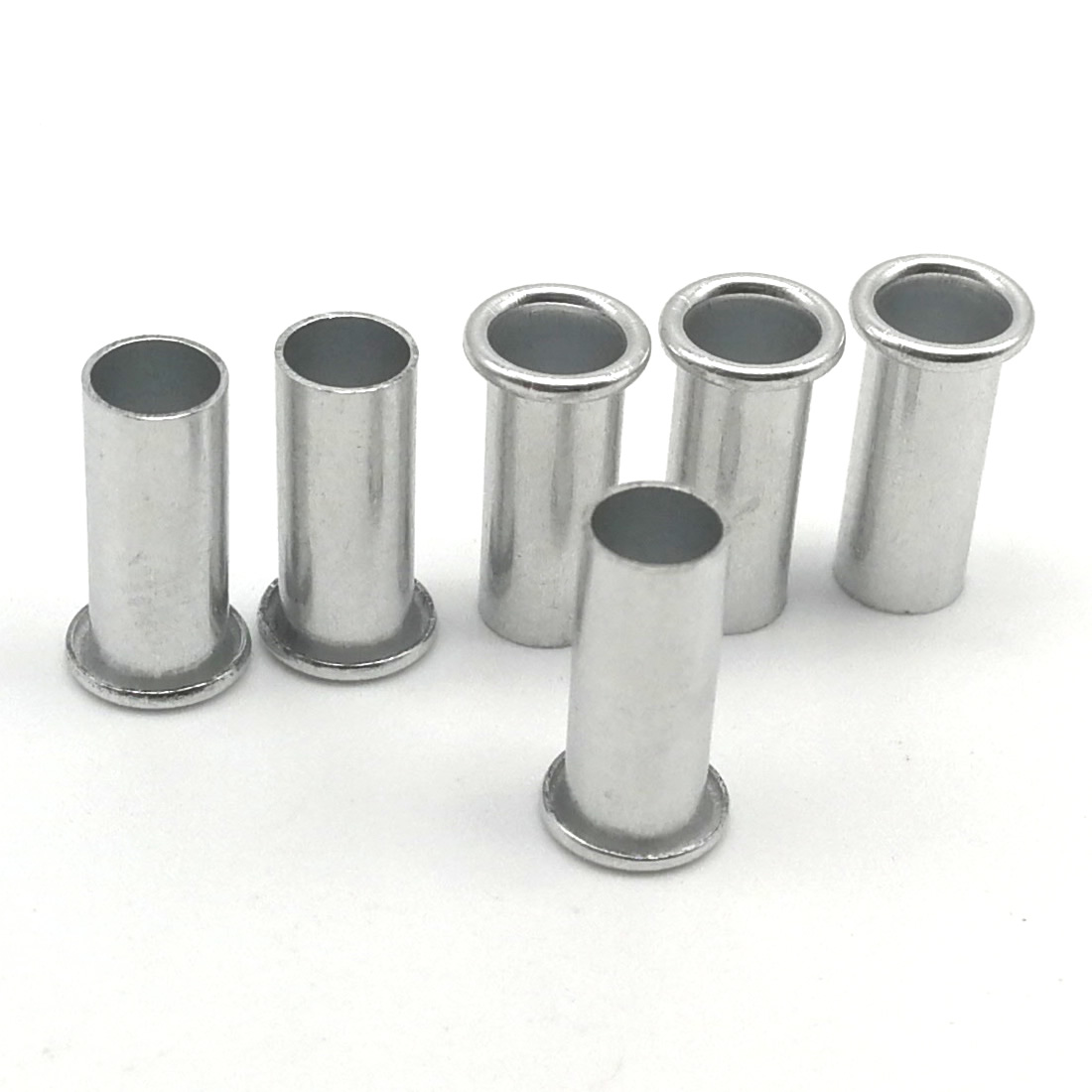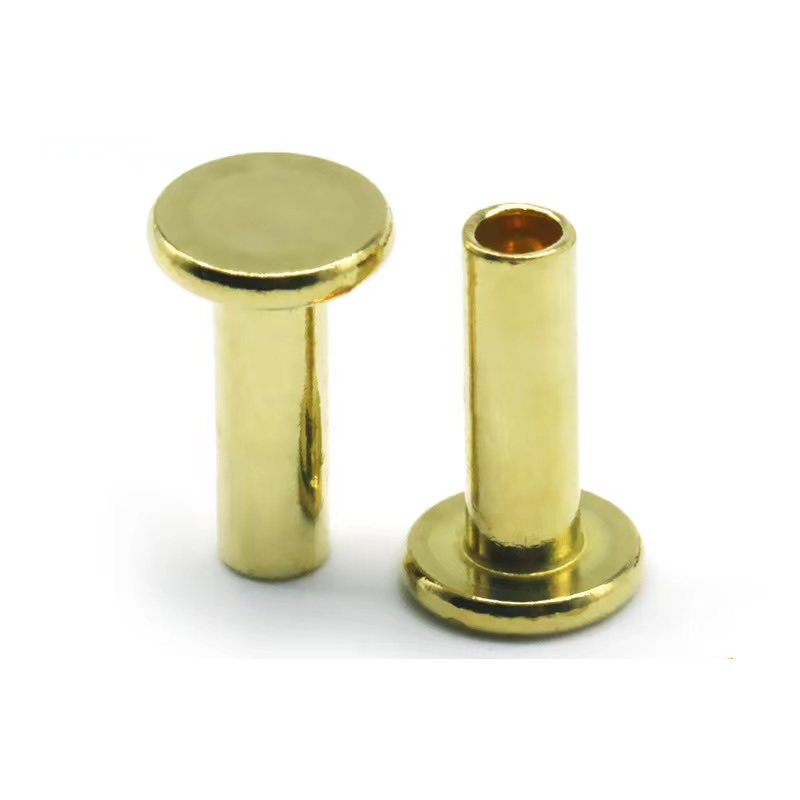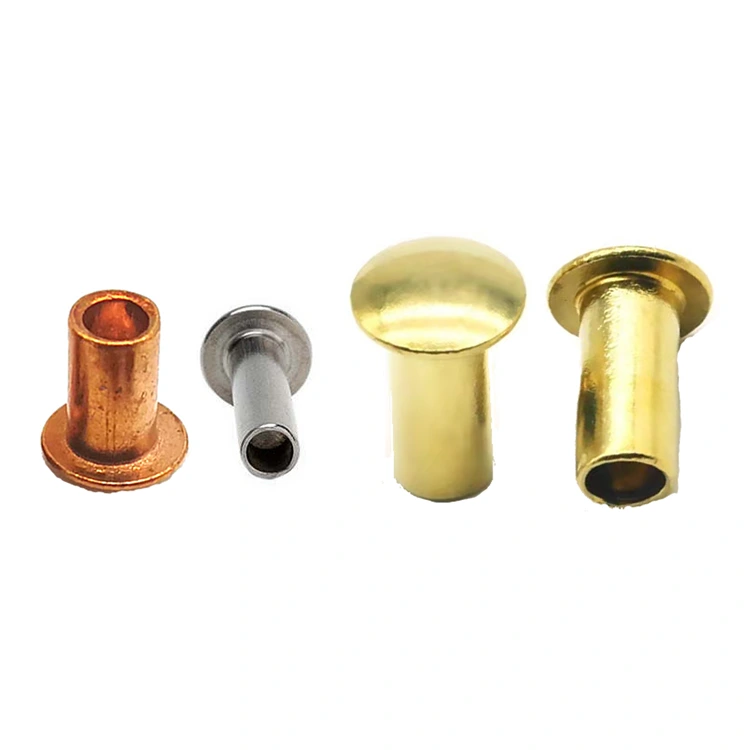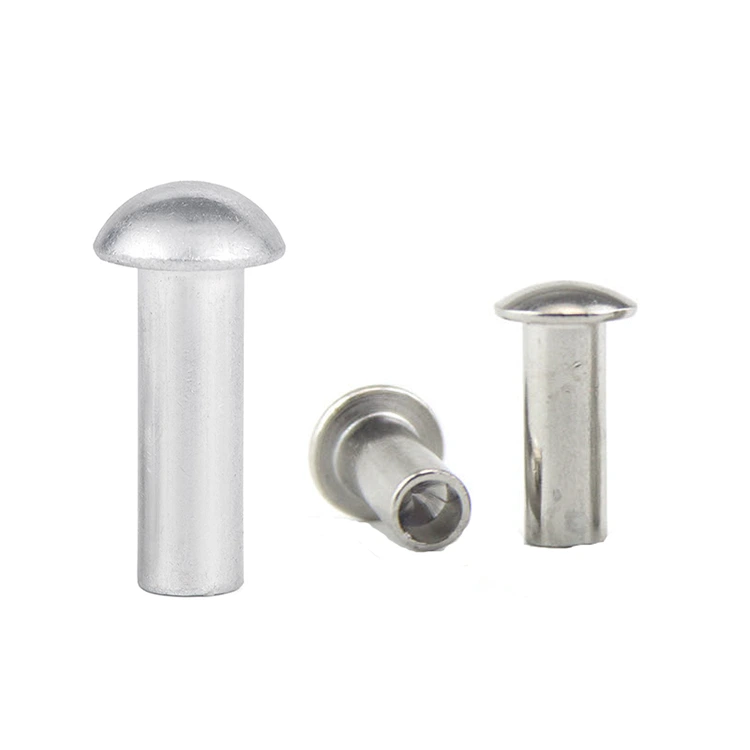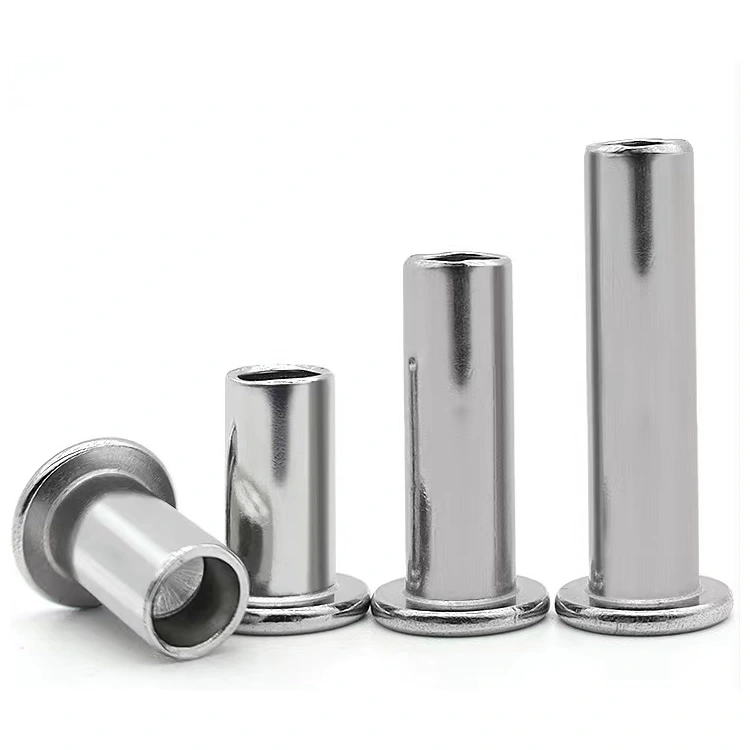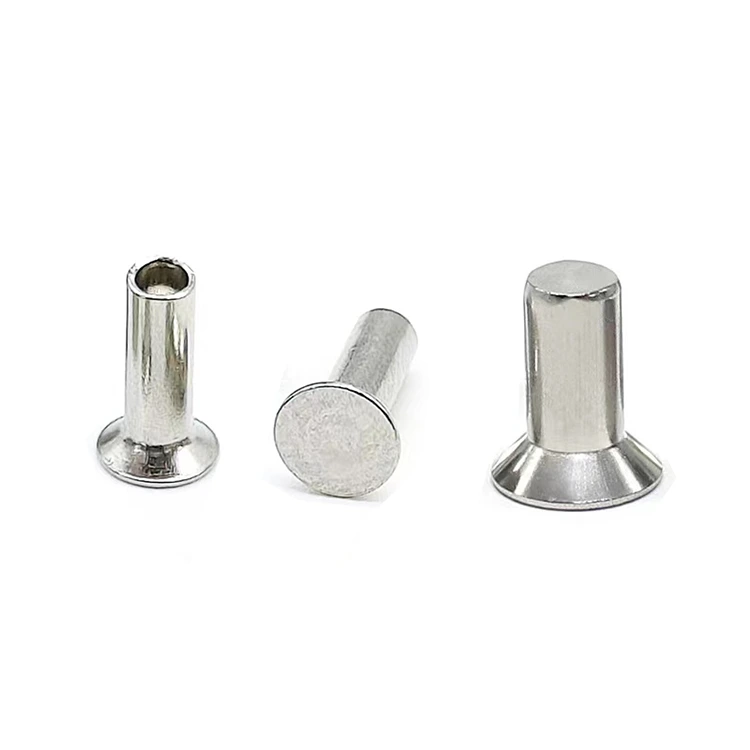Nieten
As one of professional manufacturer in China, Notin would like to provide you Rivets. And we will offer you the best after-sale service and timely delivery.
What is a rivet?
A rivet is a permanent mechanical fastener used to join two or more materials. Rivets work by inserting a metal pin into an aligned hole and deforming the end, creating a strong, secure, and durable connection. Unlike temporary fasteners like screws, rivets do not rely on threads, but instead form a permanent connection, making them ideal for applications requiring high strength, durability, and vibration resistance.
Classification of Rivets
Rivets are typically categorized by head shape, degree of hollowness, or material.
Based on head shape, rivets can be classified as flat head rivets, round head rivets, countersunk head rivets, mushroom head rivets, universal head rivets, truss head rivets, etc.

Based on degree of hollowness, rivets can be classified as solid rivets, semi-tubular rivets, or full tubular rivets.
Based on material, rivets can be classified as brass rivets, stainless steel rivets, steel rivets, aluminum rivets, copper rivets, etc.

What surface finishes are available for rivets?
Rivet surfaces are typically treated with rust-proofing treatments, primarily electroplating, including zinc plating, nickel plating, chrome plating, tin plating, gold plating, and silver plating. Electroplating is a common rust-proofing method for rivets. It applies a layer of plating to the rivet surface through physical or chemical methods. The plating effectively prevents corrosion and rust, while also providing a certain aesthetic effect.
Another special surface treatment method is head coating. Head coating is performed after the rivet is electroplated. This allows for a variety of colors on the rivet head, achieving an aesthetically pleasing finish.
Aluminum rivets cannot be electroplated, but they can be anodized. Anodizing also allows for a variety of color options, but the unit price is higher than electroplating.
Rust-proofing the rivet surface is crucial, effectively extending the rivet's service life and ensuring a secure connection. Different rust-proofing methods are suitable for different environments and applications, so the choice should be tailored to the specific situation.
- View as
Hohlnieten aus Aluminium
Hohlnieten aus Aluminium sind ein gängiges Befestigungselement und werden aufgrund ihres geringen Gewichts, ihrer Korrosionsbeständigkeit und ihrer guten elektrischen Leitfähigkeit in vielen Bereichen häufig eingesetzt. Nuote Metals produziert und vertreibt Hohlnieten aus Aluminium in China. Wir verfügen über mehr als 10 Jahre Berufserfahrung in dieser Branche.
WeiterlesenAnfrage absendenHalbhohlnieten aus Messing
Bei Nuote Metals konzentrieren wir uns auf die Herstellung von Halbhohlnieten aus Messing. Unsere Nieten verwenden hauptsächlich H65-Messing – eine Kupfer-Zink-Mischung, die eine hervorragende elektrische und thermische Leitfähigkeit sowie eine solide Korrosionsbeständigkeit bietet. Dieses Material ist sowohl hart als auch flexibel genug, um gut für Kaltstauch- und Nietverfahren geeignet zu sein. Außerdem hat Messing eine natürliche goldene Farbe. Wenn Sie es also zu dekorativen Zwecken verwenden, ist oft keine zusätzliche Beschichtung erforderlich.
WeiterlesenAnfrage absendenFlachkopf-Halbhohlnieten
Haben Sie sich jemals gefragt, wie unsere Flachkopf-Halbhohlnieten hergestellt werden? Hier ist eine kurze Anleitung:
Zuerst wählen wir den richtigen Metalldraht aus und schneiden ihn auf die exakt benötigte Länge zu. Dann geht es zur Kaltstauchmaschine, die den Draht stanzt und in die Grundnietform formt – dort nehmen der Flachkopf und der Hohlschaft wirklich Gestalt an. Als nächstes folgt die Wärmebehandlung; Wir passen die Zeit und Temperatur je nach Material an, um sicherzustellen, dass jede Niete die richtige Festigkeit und Zähigkeit hat. Danach fügen wir oft eine schützende Oberfläche hinzu – zum Beispiel Verzinkung oder Passivierung –, um ihnen zu helfen, Rost abzuwehren und länger zu halten. Und wir überspringen nie die Endkontrolle: Jede Charge wird überprüft, um sicherzustellen, dass Größe, Verarbeitung und Leistung dem Standard entsprechen.
Wir freuen uns immer, Kunden herumzuführen – wenn Sie jemals in der Gegend sind, lassen Sie es uns einfach wissen und wir organisieren eine Tour!
Halbhohlnieten mit Pilzkopf
Halbhohlnieten mit Pilzkopf verdanken ihren Namen ihrem ausgeprägten kuppelförmigen Kopf, der ein wenig wie eine Pilzkappe aussieht, kombiniert mit einem teilweise hohlen Schaft. Durch dieses Design formt sich die Niete während der Installation selbst und sorgt so für einen starken Halt – perfekt für Anwendungen, bei denen Sie sowohl gutes Aussehen als auch solide Leistung benötigen. Beim Setzen weitet sich das hohle Ende aus und sorgt für einen festen Halt, während der Kopf und der obere Teil des Schafts für zusätzlichen Halt stabil bleiben.
WeiterlesenAnfrage absendenEisen-Halbrohrnieten
Halbrohrnieten aus Eisen sind mechanische Verbinder mit hohlem Endstück. Sie funktionieren, indem sie den hohlen Teil zusammendrücken und ihn nach außen umbiegen, um eine dauerhafte Schnappbefestigung zu schaffen. Die Kernanwendungen konzentrieren sich auf Leichtindustrien wie Bekleidung, Schuhe und Gepäck. Der Einsatz von weichem Drahtmaterial vermeidet Rissbildung bei Nietverbindungen und bietet Kostenvorteile. Nuote Metals ist ein professioneller Hersteller von Halbrohrnieten aus Eisen. Unsere Nieten sind von hoher Qualität und jede einzelne wird einer gründlichen Prüfung unterzogen, um die Kundenzufriedenheit sicherzustellen.
WeiterlesenAnfrage absendenHalbhohlnieten mit Senkkopf
Warum Halbhohlnieten mit Senkkopf anstelle anderer Verbindungsmethoden wählen? Dies liegt vor allem an ihren einzigartigen Vorteilen. Nach der Installation schließt der Kopf bündig mit der Oberfläche ab, wodurch potenzielle Störungen oder Sicherheitsrisiken durch Vorsprünge vermieden werden. Das halbhohle Design macht den Nietvorgang relativ einfach und erfordert keine komplexe Ausrüstung; Sie kann in der Regel manuell oder mit pneumatischen Werkzeugen durchgeführt werden. Dieser Niettyp ist für unterschiedlich dicke Materialien geeignet und kann durch Anpassung der Nietkraft an verschiedene Situationen angepasst werden.
WeiterlesenAnfrage absendenWhat are the advantages of rivets over other fasteners?
1. Ease of Installation
Rivets are fast to install, and even fully automated for high-volume applications, resulting in a simple and efficient operation process.
2. Connection Reliability
The riveting process is standardized, with strict quality control, resulting in highly stable connections. Visual inspection allows for quick verification of connection quality.
3. Vibration and Impact Resistance
Rivets connect through deformation or interference fit, providing strong clamping force and excellent vibration resistance, capable of withstanding vibration and shock.
4. Low Cost
Rivets are easy to install and can be fully automated, saving significant labor costs.
What are the advantages and disadvantages of rivets made of different materials?
Aluminum Rivets
Advantages: Lightweight, reduces overall product weight, low cost, suitable for general civilian applications.
Disadvantages: Low tensile and shear strength, unsuitable for high-strength workpieces, prone to electrochemical corrosion when in contact with metals such as stainless steel.
Stainless Steel Rivets
Advantages: Strong corrosion resistance, high hardness, suitable for high-strength workpieces (such as marine equipment)
Disadvantages: Higher cost, typically more expensive than aluminum rivets of the same specification.
Brass and Copper Rivets
Advantages: Excellent conductivity (such as connecting electronic components), good corrosion resistance.
Disadvantages: Higher cost, more difficult to process.
Steel Rivets
Advantages: High hardness, high connection reliability, and wide applicability.
Disadvantages: Compared to other materials, iron rivets are more prone to rusting.
What are the main applications of rivets?
Rivets have a wide range of uses, from small items like a pair of scissors to large items like airplanes and ships, as well as in high-precision medical applications.
Industrial Manufacturing
Rivets are used in a wide variety of industrial fields, wherever there is a need to connect two or more materials.
Electronics
Rivets secure heat sinks and chips, providing both vibration damping and noise reduction, and are widely used in the cooling systems of electronic products such as computers and mobile phones.
Automotive
Rivets are widely used to connect components of automobile bodies and chassis, such as doors and hoods. Their lightweight and corrosion-resistant properties make them an indispensable joining method in automotive manufacturing.
Aerospace
In aircraft manufacturing, rivets are used to connect different fuselage components, such as wings and tailplanes. Millions of rivets create high-strength, corrosion-resistant joints. Aluminum and titanium alloy rivets are often used to connect components of corresponding materials, ensuring stability in extreme environments.
Rivets are used everywhere. The above examples only represent a small number of their applications. We see rivets everywhere in our daily lives, such as on scissors, folding beds, and strollers etc. Rivets can be customized to different sizes and materials depending on the application.
Nuote Metals has specialized in the rivet industry for over a decade. Our factory is located in Dongguan, a city known as the "World Factory," a city with a developed industry and convenient transportation. This allows us to respond quickly when acquiring raw materials and supporting surface treatments, meeting our customers' needs for quick access to samples and bulk orders. We produce 10 million rivets daily and have molds of various specifications, allowing us to produce rivets as small as 0.8mm and as large as 10mm. We welcome your inquiries and visits.







